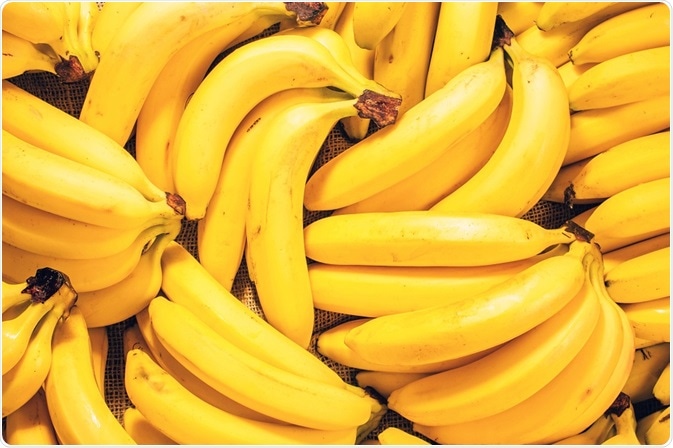For The Latest Medical News, Health News, Research News, COVID-19 News, Pharma News, Glaucoma News, Diabetes News, Herb News, Phytochemical News, Thailand Cannabis News, Cancer News, Doctor News, Thailand Hospital News, Oral Cancer News, Thailand Doctors
Bananas have been around for centuries, and the largest production is in India which, however, consumes most of what it produces itself. This is not surprising, given the unique blend of taste and health that makes up a banana, complete with its own individual wrapper (biodegradable to boot), and inbuilt marker of expiry dates (as the skin turns black).
 Credit: Hanna_photo/ Shutterstock.com
Credit: Hanna_photo/ Shutterstock.com
Bananas are often classified as sweet bananas, which are eaten as a dessert or snack, and cooking bananas, which are usually called plantains. Votaries swear by them either raw or cooked or processed in various forms.
Bananas contain several bioactive compounds including:
They are also rich in a number of beneficial nutritional components. These include (per medium banana, about 118 g):
Banana consumption has been studied in a number of ways, and some of the health impacts include:
One medium banana contains about 105 calories, compared to 144 calories for a serving of potato. Bananas are thus cost-effective as a source of energy. They are used as quick nutrient-dense boosts of energy for endurance workouts and sports, with a glycemic index of 51.
The bioactives in bananas include several strong antioxidants (banana has over 1000 mmol of TE in ORAC units, comparable to kiwi fruit), and are thus useful in protecting the body against inflammatory and oxidative stresses. They may protect against age-related or other chronic degenerative conditions.
The high potassium content is probably responsible for its ability to reduce the blood pressure, along with its low sodium content. Potassium deficiency is thought to be the underlying factor in hypertension, especially because it helps to push down sodium concentration in the blood. Some studies found that eating a couple of bananas a day led to a 10% fall in blood pressure over one week, and that 5 bananas a day was half as effective as the use of antihypertensive medication.
Diabetics would benefit from consuming under-ripe rather than overripe bananas, which have a glycemic index of 43 and 74 respectively and cause the blood glucose to rise to an average of 62 and 106 respectively. This is due to the increased starch content as compared to sugar content in under-ripe bananas.
The high fiber content of banana makes it ideal as a low-calorie nutrient-dense food for overweight people. The resistant starch in under-ripe bananas and plantains can substitute for many calorie-rich starchy foods, and its benefits go beyond diabetes control to dyslipidemia correction and weight control. It also promotes satiety and reduces total energy intake.
While having 75 or more servings of fruits or vegetables per month is known to be protective against renal cell carcinoma by about 40%, this effect was most marked in the case of banana consumption.
Resistant starch may also help reduce or dilute the concentrations of toxic substances such as fecal ammonia and N-nitroso compounds in the colonic lumen, but this is still under study. If confirmed, bananas would play a part in preventing colon cancer by reason of the lente carbohydrate (slowly digested carbohydrate).